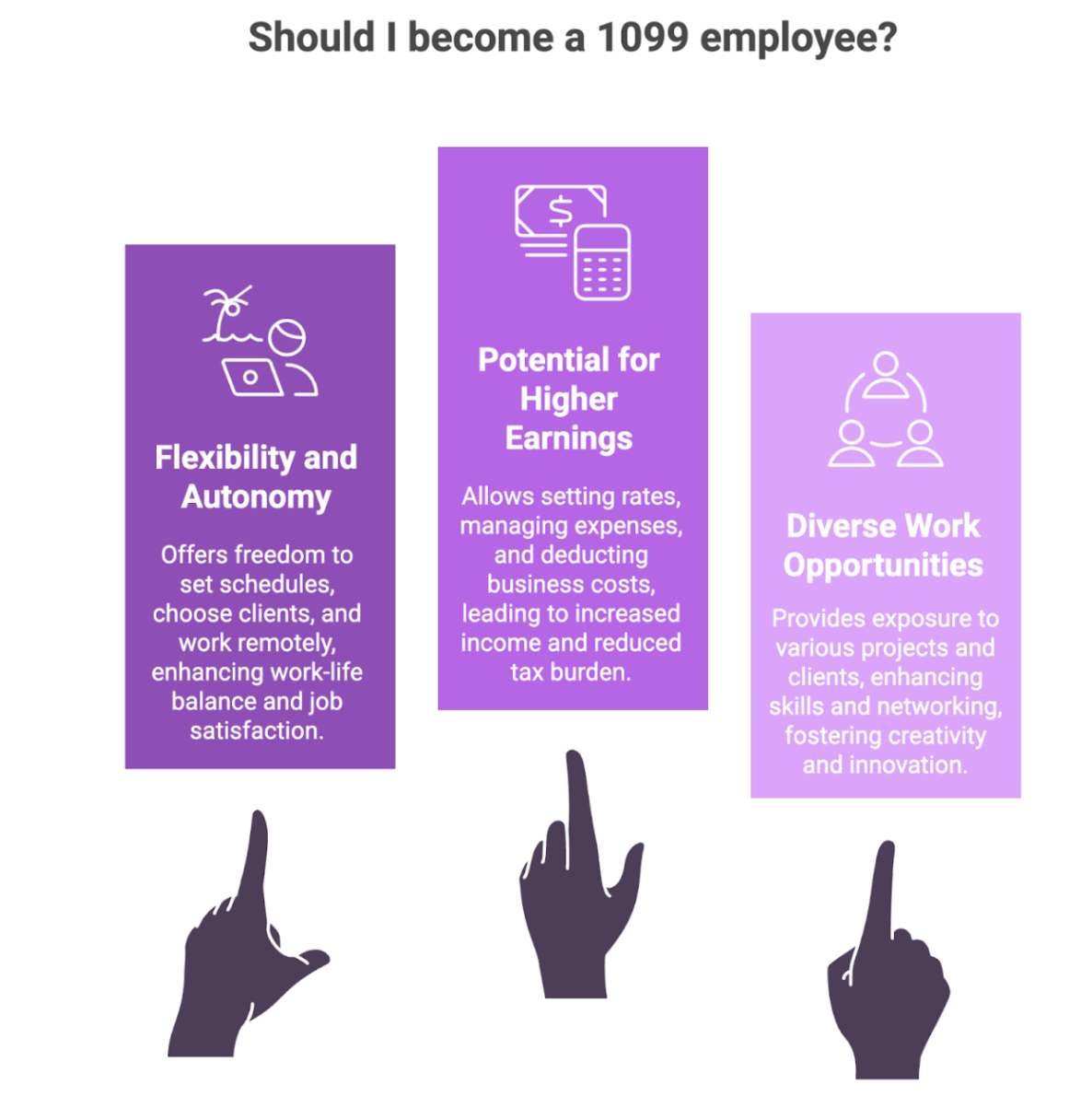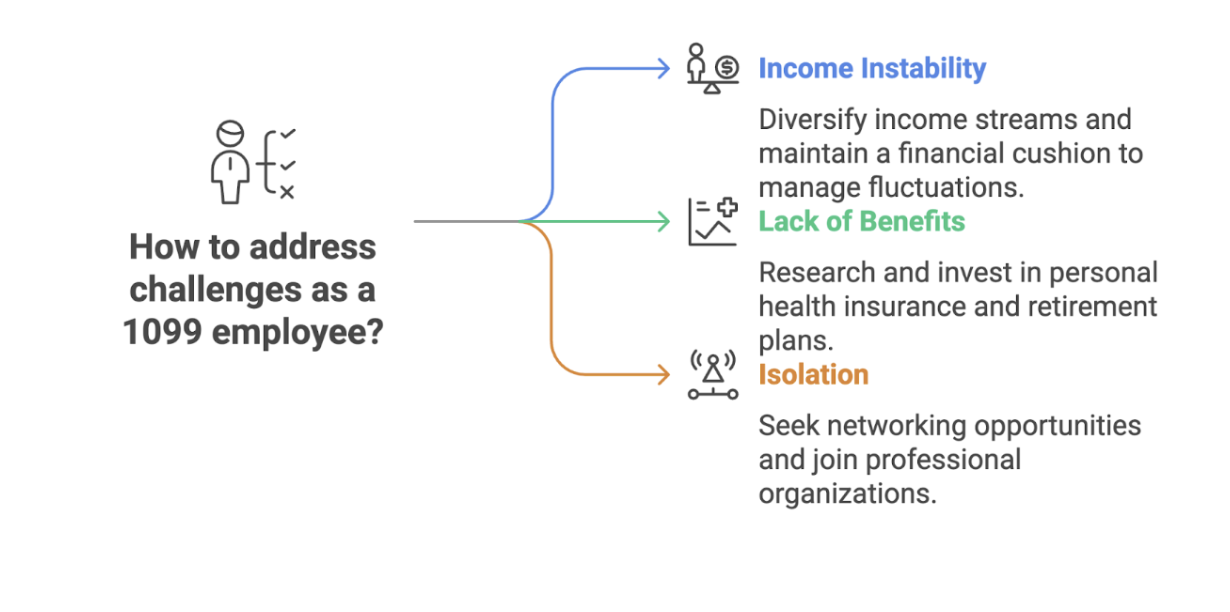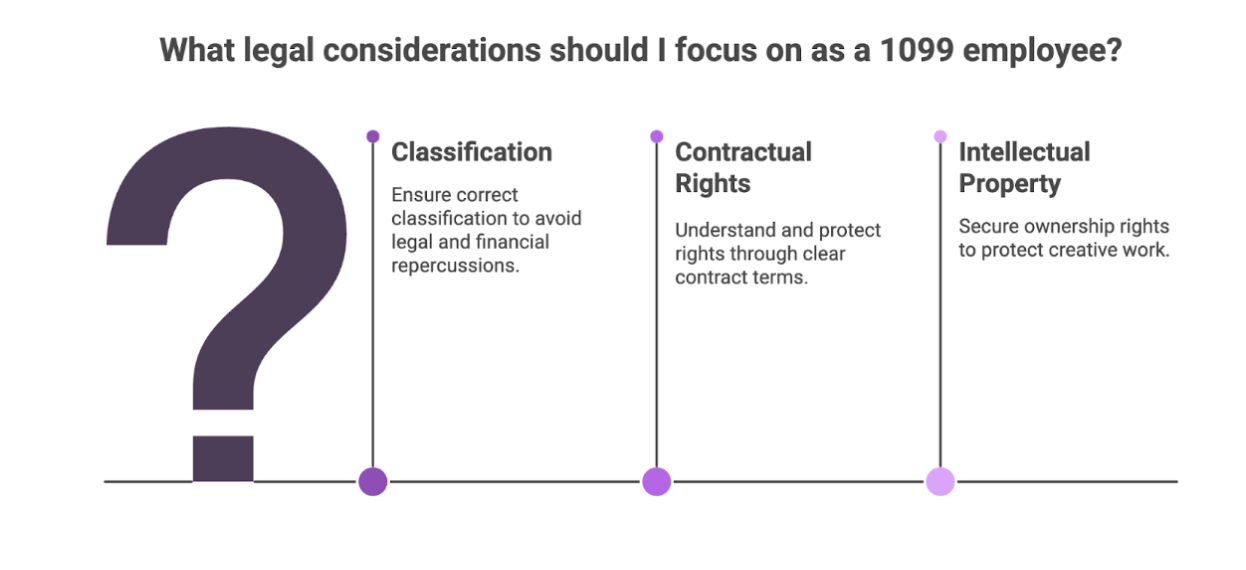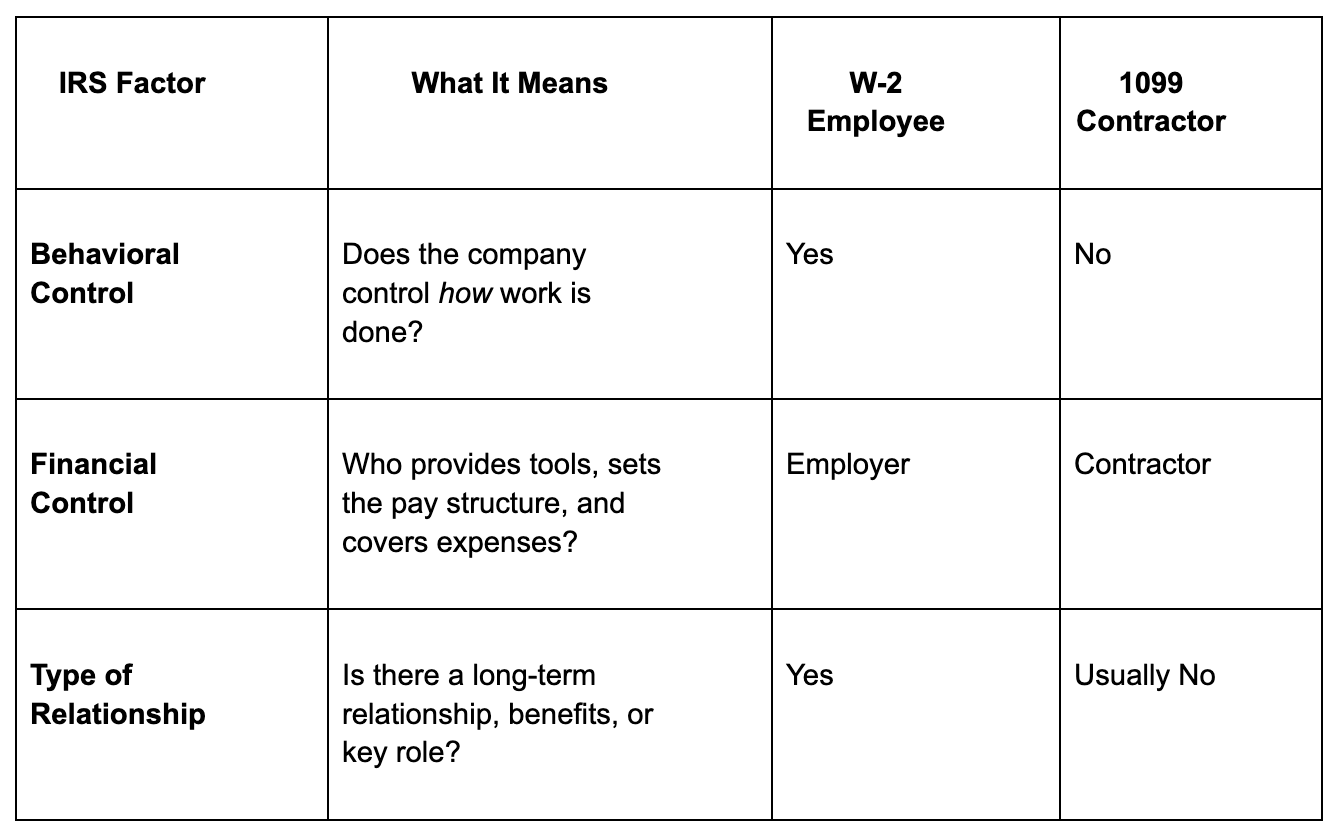In the evolving landscape of the modern workforce, the classification of employees has become increasingly nuanced.
Among these classifications, 1099 employees, or independent contractors, play a significant role. Understanding their responsibilities, rights, and the implications of their employment status can be crucial for both workers and employers.
This article delves into the intricacies of being a 1099 employee, shedding light on their roles, responsibilities, and the broader implications for the workforce.
A 1099 employee, often referred to as an independent contractor, is a self-employed individual who provides services to clients or businesses under a contract. Unlike traditional employees, who receive a W-2 tax form for tax purposes, 1099 employees receive a Form 1099, which reports their income to the Internal Revenue Service.
This distinction carries significant implications for how they manage taxes, employee benefits, and their overall work-life balance.
1099 employees exhibit several defining characteristics that set them apart from traditional employees. Primarily, they have the freedom to choose when and how they work. This flexibility often attracts individuals seeking a better work-life balance or those pursuing multiple projects simultaneously.
For many, this autonomy can lead to increased job satisfaction, as they can tailor their work environment and schedule to fit their personal preferences and lifestyle.
Moreover, 1099 workers typically handle their own taxes. They are responsible for paying self-employment taxes, which include both the employer and employee portions of Social Security and Medicare taxes. This financial responsibility necessitates a level of financial literacy and planning that may not be as critical for traditional employees.
Many independent contractors also take advantage of various tax deductions available to them, such as home office expenses, travel costs, and equipment purchases, which can significantly impact their net income.
Independent contractors can be found across various industries, including but not limited to technology, healthcare, creative arts, and construction. In the tech sector, for instance, freelance developers and designers often work on a project basis, allowing companies to tap into specialized skills without the long-term commitment of hiring full-time employees.
This model not only benefits the companies by providing flexibility in staffing but also allows independent contractors to work with multiple clients, enhancing their portfolio and professional network.
Similarly, in the creative industry, writers, photographers, and graphic designers frequently operate as 1099 employees, providing services to multiple clients. This model not only offers flexibility but also enables businesses to access a diverse talent pool without the overhead costs associated with full-time staff and employee benefits.
Additionally, the gig economy has seen a surge in demand for 1099 employees in sectors like ride-sharing and food delivery, where individuals can set their own hours and earn income based on their availability.
This shift towards a more freelance-oriented workforce reflects broader changes in how people view employment and career paths, with many valuing the ability to work on their own terms over traditional job security.
While the independence of being a 1099 employee can be appealing, it also comes with a unique set of responsibilities. Understanding these responsibilities is crucial for maintaining compliance and ensuring a successful independent career.
One of the most significant responsibilities of a 1099 employee is managing tax obligations. Unlike traditional employees, who have taxes withheld from their paychecks, independent contractors must estimate and pay their taxes quarterly throughout the tax year.
This includes federal income tax, state income tax (if applicable), and self-employment tax. The self-employment tax covers both the employer and employee portions of Social Security and Medicare that would normally be split between worker and employer in traditional employment.
Failure to meet these obligations can result in penalties and interest from the Internal Revenue Service. Therefore, it is advisable for 1099 employees to keep meticulous records of their income and expenses, as this can help in accurately reporting earnings and minimizing tax liabilities.
Utilizing accounting software or hiring a tax professional can also streamline this process, ensuring that all deductions are maximized and that the contractor remains compliant with tax laws.
Another critical responsibility for 1099 employees is understanding whether they truly qualify as independent contractors. The determination of whether a worker is an employee or an independent contractor depends on several factors, primarily centered around the company's right to control how work is performed.
If there's confusion about classification, workers can file Form SS-8 with the IRS to request an official determination. This form helps clarify the working relationship and can prevent issues with misclassification that could affect tax obligations and access to employee benefits.
Understanding the difference between 1099 contractor status and traditional employment is crucial, as misclassification can have significant legal and financial consequences for both parties.
Another critical responsibility for 1099 employees is understanding and adhering to contractual agreements. These contracts outline the scope of work, payment terms, deadlines, and other essential details. It is vital for independent contractors to review these agreements carefully to ensure they align with their expectations and capabilities.
In addition, 1099 employees should be aware of the implications of these contracts. For instance, non-compete clauses or exclusivity agreements may restrict their ability to take on other clients, which could impact their income potential.
Furthermore, understanding the terms of termination and dispute resolution can protect them from potential conflicts and ensure a smoother working relationship with clients.
Being a 1099 employee requires a high level of self-management. Independent contractors must be proactive in seeking new clients, managing their schedules, and delivering quality work on time. This self-directed approach is essential for building a sustainable career.
Moreover, continuous professional development is crucial for 1099 employees to stay competitive in their fields.
Engaging in training, networking, and skill-building activities can help them enhance their offerings and attract more clients. Joining professional organizations or attending industry conferences can also provide valuable insights into market trends and best practices, allowing 1099 employees to refine their skills and expand their professional networks.
Additionally, leveraging social media platforms for personal branding can significantly increase visibility and lead to new opportunities in a crowded marketplace.
While the responsibilities of a 1099 employee can be daunting, there are numerous benefits that make this employment model appealing. Understanding these advantages can help individuals determine if this career path aligns with their goals.
One of the most significant benefits of being a 1099 employee is the flexibility it offers. Independent contractors can set their own schedules, choose their clients, and decide how much work they want to take on. This level of autonomy allows for a better work-life balance, which is particularly valuable for those with family commitments or other personal pursuits.
Additionally, this flexibility can lead to increased job satisfaction, as individuals can pursue projects that genuinely interest them. The ability to work from anywhere also opens up opportunities for remote work, further enhancing the appeal of this employment model.
For instance, a graphic designer can create stunning visuals from a beach in Bali or a software developer can code from a cozy café in Paris, blending work with travel in a way that traditional employment often does not allow.
Another advantage of being a 1099 employee is the potential for higher earnings. Independent contractors often have the ability to set their rates based on their skills and market demand. Unlike traditional employees, who may be limited by salary structures and standard employee benefits packages, 1099 employees can negotiate their pay and take on multiple projects to increase their income.
Furthermore, 1099 employees can deduct business expenses from their taxable income, which can significantly reduce their overall tax burden. This ability to manage expenses effectively can contribute to a more favorable financial outcome compared to traditional employment.
For example, costs associated with home office setups, travel for client meetings, and professional development courses can all be written off, allowing contractors to invest in their growth while minimizing tax liabilities.
Working as a 1099 employee often means exposure to a variety of projects and clients. This diversity can enhance professional skills and experience, making independent contractors more marketable in their fields. Additionally, the opportunity to work with different companies can lead to valuable networking connections and potential future collaborations.
Moreover, the variety of work can keep the job interesting and engaging, reducing the monotony that sometimes accompanies traditional employment. This dynamic environment can foster creativity and innovation, which are essential in today's fast-paced job market.
For instance, a freelance writer might explore topics ranging from technology to lifestyle, allowing them to adapt their voice and style for different audiences, while a consultant might work across industries, gaining insights that can be applied to future projects.
This breadth of experience not only enriches their portfolio but also equips them with a versatile skill set that is highly sought after in an ever-evolving job landscape.

Despite the numerous benefits, being a 1099 employee is not without its challenges. Understanding these obstacles is essential for anyone considering this career path.
One of the primary challenges faced by 1099 employees is income instability. Unlike traditional employees who receive a steady paycheck through regular payroll processing, independent contractors may experience fluctuations in their earnings based on the availability of work and client demand. This unpredictability can make financial planning more challenging.
To mitigate this risk, 1099 employees should consider diversifying their client base and maintaining a financial cushion to weather lean periods. Establishing a budget that accounts for variable income can also be beneficial in managing finances effectively.
Additionally, it may be wise for independent contractors to develop multiple streams of income, such as offering different services or products, to create a more stable financial foundation. This approach not only helps in balancing out the highs and lows of income but also enhances their marketability in a competitive landscape.
Another significant drawback of being a 1099 employee is the lack of employer-provided employee benefits. Unlike traditional employees who may receive health insurance, retirement plans, and paid time off through company payroll systems, independent contractors must secure these benefits on their own. This responsibility can lead to higher out-of-pocket costs and additional administrative burdens.
As a result, 1099 employees should prioritize researching and investing in health insurance plans and retirement savings options to ensure their long-term financial security. Understanding the available resources and benefits for independent contractors can help mitigate some of these challenges.
Furthermore, many organizations and online platforms now offer group health insurance plans tailored for freelancers, which can provide more affordable options compared to individual plans. Taking the time to explore these resources can lead to significant savings and peace of mind.
Unlike traditional employees where payroll tax is automatically deducted and split between employer and employee, 1099 workers must handle the full burden of self-employment taxes. This includes paying both the employee and employer portions of Social Security and Medicare taxes, totaling 15.3% of net earnings.
Additionally, 1099 employees must make quarterly estimated tax payments throughout the tax year rather than having taxes automatically withheld from each paycheck. This requires careful financial planning and record-keeping to avoid penalties from the Internal Revenue Service.
Working as a 1099 employee can sometimes lead to feelings of isolation. Unlike traditional employees who work within a team environment and benefit from structured payroll and human resources support, independent contractors often work alone, which can be challenging for those who thrive in collaborative settings.
To combat this isolation, 1099 employees should seek out networking opportunities, join professional organizations, or participate in co-working spaces. Building a community of fellow independent contractors can provide support, encouragement, and opportunities for collaboration.
Additionally, engaging in online forums or social media groups dedicated to freelancers can help foster connections and provide a sense of belonging. Regularly attending workshops or industry events can also enhance professional skills while simultaneously expanding one's network, making the freelance journey a more enriching experience.

Understanding the legal landscape surrounding 1099 employees is crucial for ensuring compliance and protecting one's rights. Several key legal considerations should be kept in mind.
Proper classification as a 1099 employee is essential. Misclassification can lead to significant legal and financial repercussions for both the worker and the employer.
The Internal Revenue Service has specific guidelines for determining whether a worker is an employee or an independent contractor, primarily based on the level of control the employer has over the worker.
One key factor is the right to control how work is performed. If an employer has significant control over when, where, and how work is completed, the worker may actually be an employee rather than an independent contractor, regardless of what the contract states.
Independent contractors should familiarize themselves with these guidelines to ensure they are correctly classified. If there are concerns about misclassification, workers can file Form SS-8 with the IRS to request an official determination of their worker status.
Additionally, the consequences of misclassification can extend beyond financial penalties; they may also affect eligibility for benefits such as unemployment insurance, health care, and retirement plans, which are typically available to traditional employees but not to independent contractors.
Contracts are the foundation of the relationship between 1099 employees and their clients. Understanding the rights outlined in these contracts is essential for protecting oneself in case of disputes. Independent contractors should ensure that their contracts clearly define payment terms, scope of work, and any other critical details.
In the event of a dispute, 1099 employees may need to seek legal recourse to enforce their rights. Having a well-drafted contract can serve as a crucial tool in these situations, providing clarity and protection for both parties involved.
Moreover, it is advisable for independent contractors to include clauses that address conflict resolution methods, such as mediation or arbitration, which can help avoid lengthy and costly litigation processes.
This proactive approach can foster a more amicable working relationship and provide a clear path for resolving any potential disagreements.
Intellectual property (IP) is another important legal consideration for 1099 employees, particularly in creative fields. Contracts should specify ownership rights for any work produced, as this can have significant implications for both the contractor and the client.
Understanding IP rights can help independent contractors protect their creations and ensure they receive proper credit and compensation for their work. Consulting with a legal expert on IP matters can provide valuable insights and guidance in navigating these complexities.
Furthermore, it is essential for contractors to consider the implications of work-for-hire agreements, which can transfer ownership of the created work to the client, potentially limiting the contractor's ability to showcase their portfolio or reuse the work in future projects.
By negotiating favorable terms in their contracts, independent contractors can safeguard their creative output while maintaining a healthy professional relationship with clients.

Here's the short answer: There's no legal limit on how many hours a 1099 contractor can work.
Unlike W-2 employees, independent contractors (those who receive a Form 1099) are self-employed. That means:
So technically, a 1099 contractor could work 10 hours a week , or 80. It all depends on the terms of the contract and whether the contractor agrees to those terms.
But here's the part that trips up a lot of businesses:
If you're a company hiring 1099 contractors, the Internal Revenue Service doesn't just care about how many hours they work. What they care about is behavioral control.
If you're:
...you might actually be misclassifying an employee as a contractor, which can lead to serious payroll tax penalties.
🔍 IRS Guidance: One of the key distinctions between a W-2 employee and a 1099 contractor is the degree of control and independence. The more control a business has over when and how work is done, the more likely that a worker is an employee rather than an independent contractor.
The term "1099 employee" is commonly used, but it's a contradiction in itself. Legally, you're either a W-2 employee or a 1099 independent contractor , never both.
If you're running a business, getting this classification wrong can lead to Internal Revenue Service penalties, lawsuits, or back taxes. If you're a contractor, understanding your rights and responsibilities helps protect your income and stay compliant.
Let's break down the real rules around 1099 contractors, from both sides of the table.
It doesn't matter what your agreement says, what matters is how the work is actually done.
The Internal Revenue Service uses a three-part test to determine whether a worker is a true contractor or should be treated as an employee:
✅ Tip: If you're setting someone's daily schedule, requiring them to use company equipment, and they only work for you, the IRS will likely see them as a W-2 employee.

Here's what 1099 contractors are responsible for:
There's no automatic paycheck withholding. It's up to the contractor to track income, set aside taxes, and file correctly each tax year.
⚠️ For businesses: If you pay a contractor $600 or more in a tax year, you're required to file Form 1099-NEC and send them a copy by Jan 31.
1099 contractors do not receive:
They are not covered by federal wage and hour laws under the FLSA. That's why 1099s can work unlimited hours without overtime rules kicking in , but it also means they don't get labor protections.
✅ Businesses can offer voluntary perks (like bonuses), but doing so routinely may raise red flags about misclassification.
Whether you're hiring a contractor or working as one, a solid written agreement is non-negotiable. It should clearly define:
💡 Pro Tip: Even if you're working through a platform like Upwork, it's smart to have your own contract if the project is large or sensitive.
Unlike employees who receive W-2s and get taxes withheld through payroll processing, contractors must:
They may also be eligible for business deductions like:
But poor recordkeeping can lead to audit risk.
If the Internal Revenue Service or Department of Labor determines that a worker was misclassified, the business may be liable for:
🔍 The Internal Revenue Service runs random classification audits and responds to worker complaints. Many states (like California and New York) also have their own stricter classification rules.
When there's uncertainty about whether someone should be classified as an employee or independent contractor, either the worker or the business can file Form SS-8 with the Internal Revenue Service. This form requests an official determination of worker status.
When to consider filing Form SS-8:
What happens after filing:
Keep in mind that filing Form SS-8 can take several months for processing, and the determination applies specifically to the facts presented in your case.
1099 contractors offer flexibility , but they also carry risk. If you're a business, classify carefully and don't try to cut corners by calling employees "contractors." If you're a worker, know what you're signing up for , and understand your responsibilities come each tax year.
Being a 1099 employee offers a unique blend of opportunities and challenges. The flexibility, potential for higher earnings, and diverse work experiences can be incredibly rewarding. However, the responsibilities of managing taxes, navigating contracts, and addressing the inherent challenges of independent work require diligence and proactive planning.
For those considering this career path, it is essential to understand the legal implications, financial responsibilities, and the importance of self-management. Understanding the difference between 1099 contractor status and traditional employment, including the lack of standard employee benefits and the responsibility for handling payroll tax obligations, is crucial for success.
By equipping themselves with the right knowledge and resources, including proper understanding of tax form requirements and Internal Revenue Service guidelines, 1099 employees can thrive in the dynamic and evolving workforce landscape.
Ultimately, the choice to pursue a 1099 employment model should align with individual goals, preferences, and circumstances. With the right approach, being a 1099 employee can lead to a fulfilling and successful career.
Answer: A 1099 employee, technically called an independent contractor, is a worker who provides services to a business without being classified as a traditional employee. Unlike W-2 employees, 1099 contractors control how and when they complete work, use their own tools and equipment, and handle their own tax obligations. They receive Form 1099-NEC instead of W-2 forms, don't receive employee benefits, and are responsible for paying self-employment taxes on their earnings.
Answer: The IRS uses three main criteria to classify workers: behavioral control, financial control, and relationship type. Behavioral control examines who directs how work is performed, while financial control considers who provides tools, covers expenses, and determines pay methods. The relationship aspect evaluates contracts, benefits, and work permanency. Contractors typically have more autonomy, bear financial risk, and work temporarily, while employees receive direction, company resources, and ongoing employment relationships.
Answer: Businesses must file Form 1099-NEC for contractors paid $600 or more annually, with copies due to contractors by January 31st and to the IRS by the same date when filed electronically. Form 1096 serves as a summary transmittal form accompanying paper 1099s filed with the IRS by February 28th. Businesses should also maintain Form W-9 from each contractor to collect taxpayer identification information and backup withholding certifications before beginning work relationships.
Answer: Misclassifying employees as 1099 contractors can result in significant penalties including back taxes, interest, and fines. Businesses may owe unpaid payroll taxes, unemployment insurance, workers' compensation premiums, and employee benefits retroactively. IRS penalties range from $50 per incorrect form to substantial percentages of unpaid taxes. Additional consequences include Department of Labor violations, state tax penalties, and potential lawsuits from misclassified workers seeking employee benefits and protections.
Answer: 1099 contractors must pay self-employment taxes of 15.3% (Social Security and Medicare) on net earnings over $400, unlike employees who split these costs with employers. Contractors should make quarterly estimated tax payments using Form 1040ES to avoid underpayment penalties. They file Schedule C to report business income and expenses, can deduct business-related costs, and must maintain detailed records of all business transactions and receipts for tax purposes.
Answer: Providing traditional employee benefits to 1099 contractors can jeopardize their independent contractor status and suggest an employer-employee relationship. Benefits like health insurance, paid time off, retirement contributions, and company equipment typically indicate employee classification. However, contractors can receive performance bonuses tied to specific deliverables, access to company facilities when necessary for work completion, and reimbursement for pre-approved business expenses without affecting their status.
Answer: Businesses should maintain comprehensive documentation including signed independent contractor agreements, completed Form W-9s, invoices and payment records, project specifications and deliverables, and communication records demonstrating contractor autonomy. Keep contracts outlining scope of work, payment terms, and relationship expectations. Document the contractor's use of their own tools, equipment, and work methods. Maintain records showing contractors work for multiple clients and have established business operations.
Answer: Businesses using 1099 contractors exclusively should carefully document the relationship's legitimacy to avoid misclassification issues. Ensure contractors maintain separate business operations, actively market services to other clients, and demonstrate financial independence. Establish clear project-based contracts with defined deliverables, allow contractors to determine work methods and schedules, and avoid providing company equipment or office space. Consider rotating contractors or limiting exclusive arrangements to reduce misclassification risks.
If you're a 1099 employee navigating the complexities of taxes and financial management, Madras Accountancy can provide the support you need. We specialize in helping small and mid-sized CPA firms in the United States, offering outsourced tax, audit, accounting, and CAAS services.
Our offshore teams in India are equipped with the expertise to manage your financial tasks efficiently, including:
Whether you need help understanding Form SS-8 requirements, managing your responsibilities throughout the tax year, or ensuring compliance with Internal Revenue Service guidelines, our team can help you focus on what you do best.
Partner with us to reduce overhead costs and enhance your operational efficiency.

A practical comparison of hiring a freelancer vs using a dedicated offshore accounting team, focusing on continuity, quality control, security, and scaling.

How CPA firms outsource payroll and 1099 work to reduce penalties and admin load, with a clean workflow for approvals, filings, and year-end reporting.

Practical do's and don'ts for CPA firms outsourcing accounting work, based on common failure points and what successful rollouts do differently.